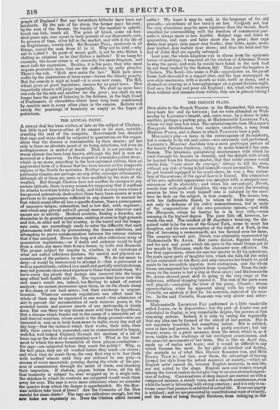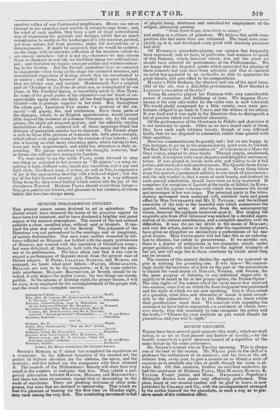satisfy the yearnings of humanity as amply as the hopes
of OUR visits to the French Theatre in the Haymarket, this season,. patriotism. have been few and far between ; but we were attracted on Wed- nesday by LAPORTE'S benefit, and, entre nous, by a desire to take that rags and skins shall be subjected to quarantine, on the suppo- MOLIERE'S play—a farce in the extravagance of its incidents, sition that the disease is transmissible by their means ; yet not but a comedy in its wit and satire—was extremely well performed. only is there no absolute proof of its being infectious, but even its LAPORTE'S Monsieur Tourdain was a most grotesque picture of contagiousness is matter of doubt. That it is not peculiar to a the foolish Parisian Cockney, toiling to make himself a fine gen- warm climate has been long known, although the fact is now an- tleman. The laborious, painstaking countenance with which he nounced as a discovery. In this respect it resembles yellow fever ; went through his lessons in dancing, and the delight with which which is no more, according to the best-informed writers, than an he learned from his fencing-master, that that noble science would aggravated form of a disease that has been known in the temperate enable him, "sans avoir du courage," always to kill his man, regions of the North for centuries. Neither is plague limited to any without any risk of being killed himself—were irresistible. When particular climate, nor perhaps are any of the scourges of humanity, he got himself equipped in his court-dress, he was a fine carica- although all of them are more or less modified by the state of the ture of the costume of the age of Louis le Grand. His admiration weather. But though Cholera does not confine its ravages to any of his own splendid appearance was mingled with a sheepish con- certain latitude, there is every reason for supposing that it confines sciousness of its absurdity ; and when his servant-girl, Nicole, its attacks to certain habits of body, and that in every case where it assails him with peals of laughter, the way in which the towering has proved extensively destructive, there have been causes at work passion he tries to work himself into is subdued by the sore- previous to its appearance sufficient in any climate to account for ness he feels on the subject, is true comedy. The scenes, too, that which seems after all less a specific disease, than a consequence with his fashionable friend, to whom he lends large sums, of excessive fatigue, exhaustion, bad or low diet, cold, exposure ; not only in defiance of his wife's remonstrances, but in spite and which may prevail and will prevail more or less wherever such of the compunctions of his own penurious nature,—and with causes are in activity. Medical sciolists, finding a disorder, not the Marquise, whom he fancies he is in love with,—were dissimilar in its general symptoms, existing at once in high grounds amusing in the highest degree. The piece falls off, however, to- and low, in cities and in the country, in the torrid and the tempe- wards the end. The incident of M. Jourdain's believing the dis- rate zone, are exceedingly ready to solve the difficulty that such guised valet to be the son of the Grand Turk, come to court his phmnomena hold out, by pronouncing the disease infectious, and daughter, and his own assumption of the habit of a Turk, in the attempting to prove communication between the various stations idea of becoming a mamamouchi, are too farcical even for farce. that it has occupied. Hence the long and often ridiculous array of The country servant girl, Nicole, was admirably represented by quarantine regulations,—as if death and sickness could be kept Mademoiselle ST. ANGE. Her rustic dialect, flippant vivacity, from a state, any more than from a house, by bolts and Bramahs and the zest and point which she gave to the smart things put in The proper subject for inquiry is, whether, in all visitations of her mouth by MoLisas, made the character very effective. On what are called infectious diseases, the mental and physical cir- her first appearance, when she sees her master in all his splendour, cumstances of the patients be not similar. We do not mean to the peals upon peals of laughter into which she falls, till she sinks deny—it would be nonsensical to attempt it—that a putrescent as at last exhausted on the floor, and only recovers her breath to yield well as a putrid body, cribbed in a small and partially ventilatedroom, again to the irresistible impulse, were contagious, and the whole may not generate gases most injurious to those that inhale them. We house accompanied her laughter from sympathy. From the ludi- have every day proofs that certain airs received into the lungs crous to the coarse is but a step in these cases; and Mademoiselle may affect both health and life. The vapours that hover over the Sr. ANGE showed great skill in going to the very verge of the sick man's couch are, indeed, too fleeting to admit of correct ludicrous, without stepping beyond it. The rest of the parts were analysis; we cannot pronounce upon them, as on the choak-damp well played,—excepting the lover of the piece, Cleonte ; whose or fire-damp of our coal-mines ; but their existence is unques- representative, when he appeared along with his witty valet tionable. Whatever sanatory regulations can effect (and the Covielle, we mistook at first for his comrade, instead of his mas- whole of them may be expressed in one word—free admission of ter. In the said Covielle, G.3.11/ARD was very clever and enter- air) to prevent the accumulation of such noxious gases, in the taming.
sportive sallies of our Continental neighbours. Hence our actors (except in low comedy) want models in nature to copy from; and,
for want of such models, they have a sort of stage conventional way of expressing the passions and feelings, which has as much resemblance to reality as the landscapes of a city amateur, painted, not from nature, but from pictures, under the instructions of a drawingmaster. It might be supposed, that we would be content, on the stage, with an accurate reflection of the manners which we see among ourselves : but it is not so,—however we may esteem them as decorous in real life, we find their image too cold and insi- pid; and therefore we require stronger outline and warmer colour- ing in the theatre. But the French comedians have no occasion to exaggerate—they bring on the stage the animated manners, and unrestrained expression of feeling, which they are accustomed to in society ; and hence, however diversified in respect to talent, they are always easy and natural. Mademoiselle PAY'S original part of Christine in La Reine de seize ans, as transplanted to our stage, in The Youthful Queen, is beautifully acted by Miss TREE. In some of the great points of the character—as her burst of un- controllable agony when she finds all her fond hopes of happiness blasted—she is perhaps superior to her rival. But, throughout the whole part, LEONTINE FAY seems "a creature of the ele- ments"—all gayety, fire, and tenderness. Even those parts of the dialogue, which, to an English apprehension, would present little beyond the evenness of common discourse, are, by the rapid glance, the slight yet eloquent gesture, and the infinitely varying modulations of voice, rendered full of those meanings which her delicacy of perception enables her to discover. The French stage is rich in those little pictures of domestic life, both grave and gay, which afford such ample room for the exercise of her talents ; and she is leaving us while many charming parts, which belong to her, have yet been unperformed, and while her attraction is daily in- creasing. We please ourselves with the thought, however, that in future she will not be a stranger to London. We were sorry to see the noble PASTA come forward to sing any thing so unsuited to her powers as "Di piacer,"—a song re- quiring a high, brilliant voice, much airy execution, and a gay and light style. Her finest song, it is true, as well as this, is expressive of joy at the approaching meeting with a beloved object ; but the joy of the light-hearted country girl, Ninetta, is a very different thing from the deep-toned feeling which enters into the joy of the chivalrous Tuncred. Madame PASTA should avoid those things— they give pain to her friends, and pleasure to her enemies, of whom talent like hers has always many.



























 Previous page
Previous page